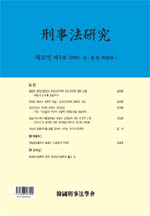학술논문
형법 제10조 제3항의 해석론에 대한 재검토
이용수 87
- 영문명
- Reconsideration of the interpretation of Article 10, Paragraph 3 of the Criminal Code
- 발행기관
- 한국형사법학회
- 저자명
- 정지훈
- 간행물 정보
- 『형사법연구』제35권 제1호, 59~100쪽, 전체 42쪽
- 주제분류
- 법학 > 법학
- 파일형태
- 발행일자
- 2023.03.30
7,840원
구매일시로부터 72시간 이내에 다운로드 가능합니다.
이 학술논문 정보는 (주)교보문고와 각 발행기관 사이에 저작물 이용 계약이 체결된 것으로, 교보문고를 통해 제공되고 있습니다.

국문 초록
그동안 한국 형법 제10조 제3항의 해석은 독일의 원인에 있어서 자유로운 행위이론의 관점으로 진행되어 왔다. 이에 따라 선행행위시 행위자의 주관적 태도를 책임고의ㆍ과실로 바꾸고 나서 고의불법에도 불구하고 선행행위시 책임고의의 탈락을 이유로 과실범으로 처벌해야 한다는 견해를 유형론이라고 부를 수 있다. 하지만 이러한구조는 스스로 내세우는 책임고의ㆍ과실의 체계적 지위에 대한 설명과도 맞지 않을뿐만 아니라, ‘행위불법 없는 책임’ 혹은 ‘객체 없는 평가’라는 범죄체계론의 붕괴를극복하기 어렵다. 또한 과실범으로의 처벌을 위해서 제10조 제3항의 요건인 예견과자의개념에 예견가능성을 책임과실로 주입하였지만, 이는 문언의 가능한 해석을 넘어범죄인에게 불리한 유추해석으로서 죄형법정주의 위반을 피할 수 없게 된다. 뿐만 아니라 독일과는 달리 한국에서 자초명정범죄의 대부분은 책임무능력이 아닌 한정책임무능력이 문제된다는 현실도 고려되어야 한다. 아직까지 유형론은 한정책임능력자에대한 이론의 적용을 명확하게 설명하지 않고 있을 뿐만 아니라 그들의 이론적 틀에의해 과실의 원인에 있어서 자유로운 행위를 인정해 버리면 고의범의 형벌감경보다더 가볍게 처벌되는 처벌의 역전현상이 초래된다. 한국에서는 이러한 유형론에 반대하면서 형법 제10조 제3항의 기능은 이미 확정된 불법행위에 대하여 오직 책임심사단계에서 책임조각 또는 책임감경을 유지하느냐아니면 완전한 책임능력을 인정해야 하는가만을 판단한다는 견해가 2000년 이후부터유력하게 제기되어 있다. 제10조 제3항의 기능에 대한 이와 같은 비유형론의 결론은타당하다. 하지만 해석론으로서는 다음과 같은 두 가지 사항이 명확해질 필요가 있다. 우선 음주운전이나 선행약물범죄, 그리고 이로 인한 자초명정상태에서 행하여진다른 범죄에 대해서는 이미 규범적으로 책임능력의 유무를 불문하고 처벌할 수 있다는 입법적인 결단이 설정되어 있으므로 이들은 제10조의 적용대상에서 제외되어야한다. 다만 음주의 경우에는 주취상태에서의 운전이나 운항 등과 같이 처벌규정에 의해 금지되지 않는 이상, 일상적인 음주와 그로 인한 범죄는 원칙으로 돌아가서 형법제10조 각 조항에 의해 책임능력 문제가 검토되어야 한다. 다음으로 실행행위의 책임능력흠결상태가 선행행위에 의해 규범적으로 책임능력이 있다고 의제될 수 있기위해서는, 행위자가 예견한 실행행위에 전형적으로 수반되는 법익침해의 가능성을 예견하고 이를 실현하기 위해서 또는 그래도 어쩔 수 없다고 생각하면서 자기 의지로심신장애를 야기한 경우에만 제10조 제3항이 적용된다고 해석해야 한다.
영문 초록
Article 10, Paragraph 3 of the Criminal Code is an inquiry that has the legal effect of recognizing a full liability in the event of a certain requirement, even if it is assessed as having no or limited culpability regarding a criminal act. In academia, it has been called an act free in the cause according to German theory, when a doer foresees the occurrence of danger and puts himself/herself in a state of mental and physical disability to implement it. Until now, the theories mobilized to solve these problems have remained at the level of reproducing the German theory. Accordingly, there has only been a discussion about punishing only a person who has committed a crime on purpose as criminal negligence, depending on what was the subjective attitude of his or her preceding act (dualistic function theory). However, since the 2000s, in opposition to this mainstream interpretive attitude, Article 10, Paragraph 3 of the Criminal Code of Korea has been argued to be the function of judging only the recognition of accountability by examining simply whether the requirements set forth in the article are met, and now the unilateral functional theory forms another influential camp. In favor of the perspective and conclusion of the unilateral functional theory, this paper conducted a further review of the criticism of the dualistic functional theory that they have raised. The results are as follows. First, Article 10, Paragraph 3 applies only to the cases where one is motivated to cause danger or is aware of the possibility, but has caused mental or physical disability (deliberately) to realize it (without denying it) or by his or her own will. Second, in the case of preceding acts such as the use of hallucinogenic substances or drugs and there is already a punitive act or an act of punishment like drunk driving, it leads to a deficiency in responsibility even if the doer commits another crime, and he must acknowledge the full culpability.
목차
Ⅰ. 시작하는 글
Ⅱ. 원인에 있어서 자유로운 행위‘이론’과 유형론
Ⅲ. 비유형론과 범죄체계론
Ⅳ. 자초명정범죄자에 대한 책임비난
Ⅴ. 맺는 글
키워드
해당간행물 수록 논문
참고문헌
교보eBook 첫 방문을 환영 합니다!

신규가입 혜택 지급이 완료 되었습니다.
바로 사용 가능한 교보e캐시 1,000원 (유효기간 7일)
지금 바로 교보eBook의 다양한 콘텐츠를 이용해 보세요!






